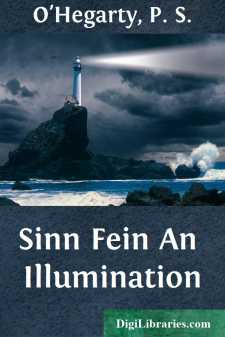Categories
- Antiques & Collectibles 13
- Architecture 36
- Art 48
- Bibles 22
- Biography & Autobiography 813
- Body, Mind & Spirit 142
- Business & Economics 28
- Children's Books 15
- Children's Fiction 12
- Computers 4
- Cooking 94
- Crafts & Hobbies 4
- Drama 346
- Education 46
- Family & Relationships 57
- Fiction 11828
- Games 19
- Gardening 17
- Health & Fitness 34
- History 1377
- House & Home 1
- Humor 147
- Juvenile Fiction 1873
- Juvenile Nonfiction 202
- Language Arts & Disciplines 88
- Law 16
- Literary Collections 686
- Literary Criticism 179
- Mathematics 13
- Medical 41
- Music 40
- Nature 179
- Non-Classifiable 1768
- Performing Arts 7
- Periodicals 1453
- Philosophy 64
- Photography 2
- Poetry 896
- Political Science 203
- Psychology 42
- Reference 154
- Religion 513
- Science 126
- Self-Help 84
- Social Science 81
- Sports & Recreation 34
- Study Aids 3
- Technology & Engineering 59
- Transportation 23
- Travel 463
- True Crime 29
Sinn Fein An Illumination
by: P. S. O'Hegarty
Description:
Excerpt
THE POLICY OF PEACEFUL PENETRATION IN IRELAND
When Pitt and Castlereagh forced through the Act of Union, they forged a weapon with the potentiality of utterly subjecting the Irish nation, of extinguishing wholly its civilisation, its name, and its memory; for they made possible that policy of peaceful penetration which in less than a century brought Ireland lower than she had been brought by five centuries of war and one century of almost incredibly severe penal legislation. In the history of the connexion between England and Ireland the vital dates are 1691, 1800, and 1893: in 1691 Ireland lay for the first time unarmed under the heel of the invader; in 1800 began the peaceful penetration of Irish civilisation by English civilisation; and in 1893 by the foundation of the Gaelic League Ireland turned once more to her own culture and her own past, alive to her separateness, her distinctiveness, alive also to her danger.
The defences of a nation against annihilation are two, physical and spiritual. Until 1691 Ireland retained and used both, and not even Cromwell was able to deprive her of her fighting men and their arms. But when Sarsfield signed the Treaty of Limerick in 1691 and carried the bulk of the fighting men out of Ireland, and when those remaining in Ireland suffered themselves to be disarmed, Ireland was left to rely upon spiritual defence onlyâupon language, culture, and memory. And these sufficed. Not even the Penal Laws could penetrate them, and behind the sure rampart of the language the Irish people, without leaders and notwithstanding the Penal Laws, re-knit their social order and peacefully penetrated the Garrison, so that at the end of the century they emerged from the ruins of the Penal Laws a Nation in bondage but still a Nation, with the language, culture, traditions and hopes of a Nation, and with the single will of a Nation.
Up to that time there had been nothing to turn their attention out of Ireland, and all their hopes of action, political or otherwise, naturally centred within Ireland. They had had little cause to love the Dublin Parliament of the eighteenth century, in which they had neither representation nor franchise, but they had had no cause whatever to be hopefully conscious of the existence of the London Parliament. The Penal Legislation inevitably threw them back on themselves, preserved their language, culture, and traditions, preserved their national continuity. And as the century wore on the more conscious and strengthened Irish Nation swayed the Garrison into something which, in time, would have developed into complete nationalism and fusion.
By changing the seat of government from Dublin to London, the Act of Union not alone killed the incipient Nationalism of the Garrison, but it, in time, totally alienated them from the Nation, by attaching them to English Parties, English ways, and making their centre London, and not Dublin. The landed proprietors and aristocracy followed the seat of government, and London became their capital also. So that, early in the nineteenth century, the Garrison classes, which towards the end of the eighteenth century had come dangerously near to making common cause with the Nation, had shifted their political and social centre to London, and became a strength to England and a weakness to Ireland....


